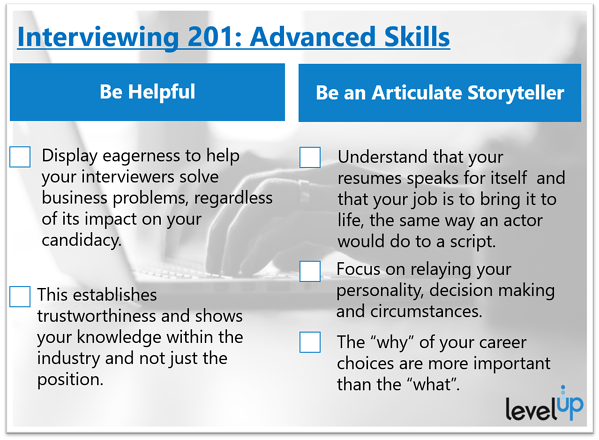Like me, you have probably read dozens of articles on the topic of interviewing. It’s very easy to find articles recommending how candidates should approach interviewing online. Titles like: “Nailing Your Job Interview”, “Interviewing for Dummies” and “Unconventional Interview Tips” are just a few variations out there. With all the attention this topic receives, I had to think long and hard before contributing to the conversation. After mulling over the thousands of “good” interviews that I have been a part of during my career, I began to think about which ones stood out and why. Quickly, it became apparent that there are at least two aspects to successful interviewing that still go under the radar. Both of them can have a significant impact on the outcome of a candidate's interview and reputation.
Interviewing 101
Before diving into those two tips, let’s do a quick recap on what many of us have learned on this topic already. Mastering the skills below can potentially land someone the role of their dreams on their own. Good candidates are successful in their interviews because they are:
Prepared – They review their resume, read the job description, study facts about the company and lookup their interviewers.
Confident – They have a firm handshake, push through difficult questions and understand why they are qualified for the role.
Friendly – They have a great smile, engage everyone that they interact with, display positive body language and they do not speak negatively of prior employers or bosses.

Interviewing 201
With the basics covered, it’s time to focus on what distinguishes advanced candidates from the rest of the group. These candidates stand out because, in addition to being dynamic professionals, they inspire the hiring manager to want to work with them. Great candidates are successful in their interviews because they are...
Unselfish Helpers
Great candidates are eager to help their interviewers solve business problems, regardless of its impact on their candidacy. This brands them as trustworthy and valuable within the industry and not just the position.
Examples:
They share lessons learned that might benefit their interviewer:
" A few years ago, my company was facing a similar challenge to yours. They saw that clients were __ and ___. We fixed that problem by ___. Depending on your goals, you might want to consider that.”
They offer their industry resources that the interviewer might need:
“You mentioned that you were having an issue with ___. Are you aware of ___software? It helped my team tremendously.”
They even consider referring someone else for the role (if they are not the right fit).
“Thanks for taking the time to meet me. Have you spoken to ___? They might be a great person to speak to regarding this project”
Articulate Storytellers
Great candidates understand that their resume speaks for itself and that their job is to bring their resume to life- the same way an actor would do to a script. They focus on relaying their personality, decision making, and circumstance while discussing their experiences. They understand that the “why” of their career is much more important than the “what”.
Examples:
They share their detailed career experiences, including people, settings and motivators:
“When I worked at ___, the company was at an inflection point. My boss was new and my team was shrinking. I needed ___, ___, and ____ to get the business to the point where we could declare success.”
They talk about their evolution as professionals and why they chose one career path versus another:
“I was actually offered a position in ____ before and declined it because I thought that ___ was a better fit for me. This is mainly because of ___”
They share an overall arc to their career path that goes beyond the standard elevator pitch:
“I am here because I have always wanted to __. When considering your business and where I am in my career right now, I think that what you have discussed, brings together my experiences doing ___, ___ and ___ in a great way.”

Cliff Notes
While being an unselfish helper and articulate storyteller is often valued outside of the professional world, its value as it applies to the interview process is often understated. The basic lessons of interviewing teach us how to relay strong professionalism. The advanced lessons to interviewing teach us how to relay our ethics and personality in that profession. This provides hiring managers the opportunity to walk away from the interview benefiting from, trusting and fully understanding the candidate. From the candidate’s perspective, this is as close to “acing” the interview as they can hope for.





